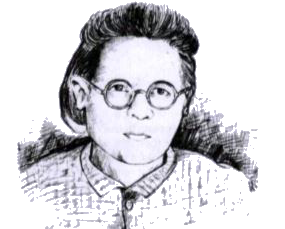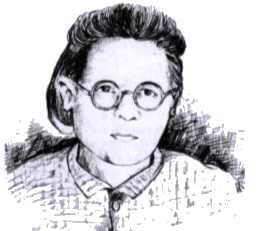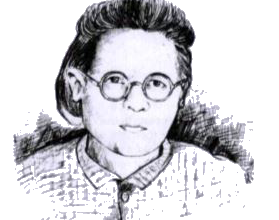During the last part of November 2012, there was a severe fire accident which took away the lives of more than hundred people in Bangladesh. The accident occurred inside a
textile factory
jute factory
polythene manufacturing factory
cement factory
Step by step video & image solution for During the last part of November 2012, there was a severe fire accident which took away the lives of more than hundred people in Bangladesh. The accident occurred inside a by General Knowledge experts to help you in doubts & scoring excellent marks in Class 14 exams.
Similar Questions
The following excerpt is from the diary of Lena Mukhina, a teenage girl who had undergone the atrocities of Germans when they fortified the city of Leningrad. The siege of Leningrad is an important landmark in the history of Russia. The siege of Leningrad lasted from September 1941 to 1944. The city was cut off from the rest of Russia. The Germans continuously bombarded the city which resulted in death, destruction, and starvation of the people. However, the resolute Russians were warned in the beginning that the enemy was at the gate and it was a question of life and death. They fought bravely and failed the Germans in their evil designs.
Read the excerpt and answer the questions that follow.
Foreword from The Diary of Lena Mukhina
No one could possibly have known that the city would remain in the grip of siege for 872 days and nights. But Leningrad's citizens had begun to feel the breath of war as early as September. Daily air raids and artillery bombardment of residential neighborhoods drove the city's inhabitants into bomb shelters, several times a day, and for hours at a time. People's initial curiosity in the aftermath of the first bomb attacks soon gave way to fear and then, in conditions of appalling hunger and cold, to apathy. Leningraders welcomed inclement weather for the reduced visibility it brought. They came to dread sunny days and moonlit nights, when the Germans would be sure to bomb their city. Cloud cover, however, offered no protection from artillery fire: in just over six months from the start of the siege, there were only thirty-two days when shells did not explode on the city's streets.

Hunger soon set in. Between September and November 1941 the bread rations that had been announced in July were reduced five times, reaching their lowest point on 20 November - 125 'blockade grams' for children, dependents and white-collar workers and 250 g for manual workers, technicians and engineers. Rations of meat, butter, sugar and other food items were severely reduced. The summer months and the beginning of autumn, when it was still possible to buy food without ration cards in ordinary shops and canteens were no more than a distant memory.
Lena Mukhina
Answer the following questions:
Why did the people under siege welcome the bad weather conditions?View SolutionThe following excerpt is from the diary of Lena Mukhina, a teenage girl who had undergone the atrocities of Germans when they fortified the city of Leningrad. The siege of Leningrad is an important landmark in the history of Russia. The siege of Leningrad lasted from September 1941 to 1944. The city was cut off from the rest of Russia. The Germans continuously bombarded the city which resulted in death, destruction, and starvation of the people. However, the resolute Russians were warned in the beginning that the enemy was at the gate and it was a question of life and death. They fought bravely and failed the Germans in their evil designs.
Read the excerpt and answer the questions that follow.
Foreword from The Diary of Lena Mukhina
No one could possibly have known that the city would remain in the grip of siege for 872 days and nights. But Leningrad's citizens had begun to feel the breath of war as early as September. Daily air raids and artillery bombardment of residential neighborhoods drove the city's inhabitants into bomb shelters, several times a day, and for hours at a time. People's initial curiosity in the aftermath of the first bomb attacks soon gave way to fear and then, in conditions of appalling hunger and cold, to apathy. Leningraders welcomed inclement weather for the reduced visibility it brought. They came to dread sunny days and moonlit nights, when the Germans would be sure to bomb their city. Cloud cover, however, offered no protection from artillery fire: in just over six months from the start of the siege, there were only thirty-two days when shells did not explode on the city's streets.

Hunger soon set in. Between September and November 1941 the bread rations that had been announced in July were reduced five times, reaching their lowest point on 20 November - 125 'blockade grams' for children, dependents and white-collar workers and 250 g for manual workers, technicians and engineers. Rations of meat, butter, sugar and other food items were severely reduced. The summer months and the beginning of autumn, when it was still possible to buy food without ration cards in ordinary shops and canteens were no more than a distant memory.
Lena Mukhina
Answer the following questions:
What were the fears in the mind of the people?View Solution
Knowledge Check
- Question 1 - Select One
There are a great many people who have all the material conditions of happiness, i.e., health, sufficient income and clout, but who nevertheless, are profoundly unhappy. In such cases it would seem as if the fault must lie with a wrong theory as to how to live. We imagine ourselves more different from the animals than we are. Animals live on impulse and are happy as long as external conditions are favourable. Your needs are more complex than those of your pets but they still have their basis in instinct. In civilised societies, this is too apt to be forgotten. People propose to themselves some paramount objective and restrain all impulses that do not minister to it. A businessman may be so anxious to grow rich that to this end be sacrifices health and private affection, When at last he has become rich, no pleasure remains to him except harrying other people by exhortations to initiate his noble example.
Which one of the following is correct? The author is of the opinion thatAwe are superior to animalsBanimals are more impulsive than usCwe are really not very different from animalsDwe have the unique ability to control our impulses. - Question 2 - Select One
There are a great many people who have all the material conditions of happiness, i.e., health, sufficient income and clout, but who nevertheless, are profoundly unhappy. In such cases it would seem as if the fault must lie with a wrong theory as to how to live. We imagine ourselves more different from the animals than we are. Animals live on impulse and are happy as long as external conditions are favourable. Your needs are more complex than those of your pets but they still have their basis in instinct. In civilised societies, this is too apt to be forgotten. People propose to themselves some paramount objective and restrain all impulses that do not minister to it. A businessman may be so anxious to grow rich that to this end be sacrifices health and private affection, When at last he has become rich, no pleasure remains to him except harrying other people by exhortations to initiate his noble example.
Which one of the following is correct?
The "material conditions of happiness" do not includeAhealthBmoneyCpowerDhope - Question 3 - Select One
There are a great many people who have all the material conditions of happiness, i.e., health, sufficient income and clout, but who nevertheless, are profoundly unhappy. In such cases it would seem as if the fault must lie with a wrong theory as to how to live. We imagine ourselves more different from the animals than we are. Animals live on impulse and are happy as long as external conditions are favourable. Your needs are more complex than those of your pets but they still have their basis in instinct. In civilised societies, this is too apt to be forgotten. People propose to themselves some paramount objective and restrain all impulses that do not minister to it. A businessman may be so anxious to grow rich that to this end be sacrifices health and private affection, When at last he has become rich, no pleasure remains to him except harrying other people by exhortations to initiate his noble example.
Which one of the following is correct? Modern man is very unhappy because theAis always bisy making moneyBfeels alienated from his follow beingsCcannot communicate with animalsDsuppresses his inner urges.
The following excerpt is from the diary of Lena Mukhina, a teenage girl who had undergone the atrocities of Germans when they fortified the city of Leningrad. The siege of Leningrad is an important landmark in the history of Russia. The siege of Leningrad lasted from September 1941 to 1944. The city was cut off from the rest of Russia. The Germans continuously bombarded the city which resulted in death, destruction, and starvation of the people. However, the resolute Russians were warned in the beginning that the enemy was at the gate and it was a question of life and death. They fought bravely and failed the Germans in their evil designs.
Read the excerpt and answer the questions that follow.
Foreword from The Diary of Lena Mukhina
No one could possibly have known that the city would remain in the grip of siege for 872 days and nights. But Leningrad's citizens had begun to feel the breath of war as early as September. Daily air raids and artillery bombardment of residential neighborhoods drove the city's inhabitants into bomb shelters, several times a day, and for hours at a time. People's initial curiosity in the aftermath of the first bomb attacks soon gave way to fear and then, in conditions of appalling hunger and cold, to apathy. Leningraders welcomed inclement weather for the reduced visibility it brought. They came to dread sunny days and moonlit nights, when the Germans would be sure to bomb their city. Cloud cover, however, offered no protection from artillery fire: in just over six months from the start of the siege, there were only thirty-two days when shells did not explode on the city's streets.

Hunger soon set in. Between September and November 1941 the bread rations that had been announced in July were reduced five times, reaching their lowest point on 20 November - 125 'blockade grams' for children, dependents and white-collar workers and 250 g for manual workers, technicians and engineers. Rations of meat, butter, sugar and other food items were severely reduced. The summer months and the beginning of autumn, when it was still possible to buy food without ration cards in ordinary shops and canteens were no more than a distant memory.
Lena Mukhina
Answer the following questions:
Have the people lost hope or reconciled to the existing situation?View SolutionIn the following question the 1st and the last part of the sentence/passage are numbered 1 and 6. The rest of the sentence/ passage is split into four parts and named P, Q, R and S. These four parts are not given in their proper order. Read the sentence/passage and find out which of the four combinations is correct.
1. Health and fitness have now become one of the major concerns.
P. This made life active and alert.
Q. Earlier humans used to hunt for their living.
R. Now, life has become more simple and easy.
S. Due to which their body had to undergo a lot of physical exercise.
6. Everything we need is just a phone call away.View SolutionMountaineering is now looked upon as the king of sports. But men have lived amongst the mountains since pre-historic time and in some parts of the world, as in the Andes and Himalayas, difficult mountain journeys have inevitably been part of their everyday life. However, some of the peaks were easily accessible from most of the cities of Europe. It is quite interesting that while modern mountaineers prefer difficult routes for the greater enjoyment of sport, the early climbers looked for the easiest ones,
for the summit was the prize they all set their eyes on. Popular interest in mountaineering increased considerably after the ascent of the Alpine peak of Matterhorn in 1865 and Edward Whiymper's dramatic account of the climb and fatal accident which occurred during the descent.
In the risky sport of mountaineering, the element of competition between either individuals or teams is' totally absent. Rather one can say that the competition is between the team and the peaks themselves. The individuals making up a party must climb together as a team, for they depend upon one another for their safety. Mountaineering can be dangerous unless reasonable precautions are taken. However, the majority of fatal accidents happen to parties which are inexperienced or not properly equipped. Since many accidents are caused by bad weather, the safe climber is the man who knows when it is time to turn back, howsoever t may be to press on and try to reach the summit.
People living in the Andes and the
Himalayas made mountain journeys becauseView SolutionMountaineering is now looked upon as the king of sports. But men have lived amongst the mountains since pre-historic time and in some parts of the world, as in the Andes and Himalayas, diffcult mountain journeys have inevitably been part of their everyday life. However, some of the peaks were easily accessible from most of the cities of Europe. It is quite interesting that while modern mountaineers prefer difficult routes for the greater enjoyment of sport, the early climbers looked for the easiest ones, for the summit was the prize they all set their eyes on, Popular interest in mountaineering increased considerably after the ascent of the Alpine peak of Matterhorn in 1865 and Edward Whymper's dramatic account of the climb and fatal accident which occurred during the descent.
In the risky sport of mountaineering, the element of competition between either individuals or teams is totally absent. Rather one can say that the competition is between the team and the peaks themselves. The individuals making up a party must climb together as a team, for they depend upon one another for their safety. Mountaineering can be dangerous unless reasonable precautions are taken.
However, the majority of fatal accidents happen to parties which are inexperienced or not properly equipped many accidents are caused by bad weather, the safe climber is the man who knows when it is cimber to turn back, now so ever tempting it may be to press on and try to reach the summit.
People living in the Andes and the Himalayas made mountain journeys becauseView SolutionMountaineering is now looked upon as the king of sports. But men have lived amongst the mountains since pre-historic time and in some parts of the world, as in the Andes and Himalayas, difficult mountain journeys have inevitably been part of their everyday life. However, some of the peaks were easily accessible from most of the cities of Europe. It is quite interesting that while modern mountaineers prefer difficult routes for the greater enjoyment of sport, the early climbers looked for the easiest ones,
for the summit was the prize they all set their eyes on. Popular interest in mountaineering increased considerably after the ascent of the Alpine peak of Matterhorn in 1865 and Edward Whiymper's dramatic account of the climb and fatal accident which occurred during the descent.
In the risky sport of mountaineering, the element of competition between either individuals or teams is' totally absent. Rather one can say that the competition is between the team and the peaks themselves. The individuals making up a party must climb together as a team, for they depend upon one another for their safety. Mountaineering can be dangerous unless reasonable precautions are taken. However, the majority of fatal accidents happen to parties which are inexperienced or not properly equipped. Since many accidents are caused by bad weather, the safe climber is the man who knows when it is time to turn back, howsoever t may be to press on and try to reach the summit.
"To press' in the last sentence of the passage meansView Solution

